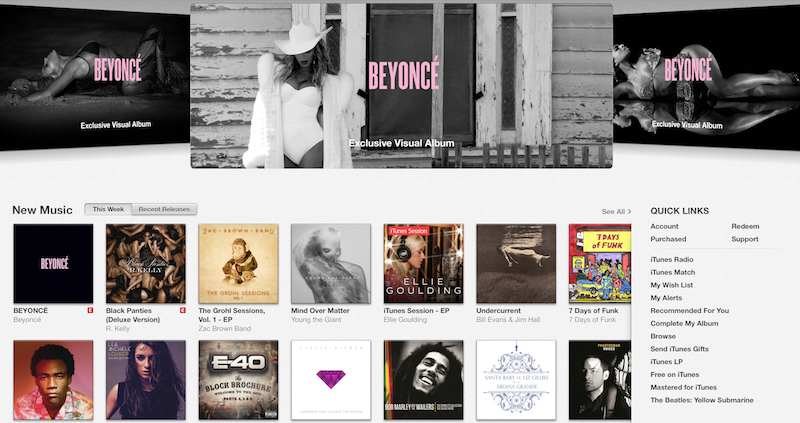Beyoncé’s fifth self-named album was released as an iTunes-exclusive with absolutely no hype five days ago. Billboard said the album had sold 80,000 copies in just three hours on its first day of iTunes release. Three days in, the digital download pulled 828,773 downloads, Apple confirmed.
It’s become the fastest selling album ever on iTunes, broke the US first-week album sales record and went straight to number one in 104 countries. Today, Apple and Columbia have confirmed that the album has passed one million iTunes downloads.
This could easily be a watershed moment for the slowing sales of digital music downloads, if you ask me. If anything, Beyoncé’s proves that album sales are not dead yet even though digital music sales were down four percent through Thanksgiving…
One million downloads translates to roughly $16 million in digital music revenue, in less than a week. After Apple’s 30 percent cut, Beyoncé and Columbia took home a cool $11 million. Keep in mind that songs from the album won’t become available for individual purchase until December 20.
Of course, the fact that Beyoncé is the world’s top female pop artist with 53 million Facebook fans, 13 million Twitter followers and 8 million Instagram fans was a factor, too.
Still, it’s mind-boggling that Beyoncé’s album hasn’t leaked to the public, but that’s because she refrained from sending the songs to be manufactured until after the album hit iTunes. Even the videos were shot in secrecy.
If the success of this unheard-of collaboration between the artist and Apple is an indication, there should be more iTunes exclusives like this one going forward. It also begs the question of how effective PR bunnies at record labels really are if an international pop star like Beyoncé, 32, can pull these kinds of numbers without much PR.
Peter Kafka summed it up nicely over at AllThingsD:
During the peak of the CD era, it was routine for acts like NSync to move more than a million albums in a week, but those days are long gone. A couple of years ago, when Lady Gaga was arguably at her peak, she was able to sell 1.15 million, but that involved a multi-outlet publicity campaign — and 400,000 of those sales were at a buck a pop, via Amazon.
Another repercussion for the music biz: Target has said it won’t sell her album due to the fact it debuted as an iTunes exclusive, fearing early digital rush will harm physical sales.
According to Target spokeswoman Erica Julkowski:
At Target we focus on offering our guests a wide assortment of physical CDs, and when a new album is available digitally before it is available physically, it impacts demand and sales projections.
While there are many aspects that contribute to our approach and we have appreciated partnering with Beyoncé in the past, we are primarily focused on offering CDs that will be available in a physical format at the same time as all other formats.
Target is the nation’s fourth-largest seller of music with five percent of the market. Apple’s iTunes of course leads with a commanding 41 percent share of U.S. music sales, followed by Walmart at ten percent and Amazon at nine percent.
None of this is saying that digital music sales are on the rise.
Quite the contrary, streaming services like Rdio, Pandora, iTunes Radio, Spotify, iHeartRadio, Google Play Music and others are all stealing from digital sales as people grow more accustomed to the idea of paying a few bucks to stream any song they want, as opposed to owning the digital files.
Beyoncé’s digital iTunes download includes a digital booklet, fourteen songs and seventeen “visually stunning, provocative videos” shot around the world from Houston to New York City to Paris, and Sydney to Rio de Janeiro, all before the album’s release.
Beyoncé is available for $15.99 from iTunes.
